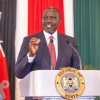
The August 9th elections may be beckoning to millions of voters but don't count me in. I will not be voting this time after participating in almost every election cycle since 1992.
I really resent what my country has become. The downward spiral of leadership that has seen the growth of cartels and the vicious machination of national politics.
So here we are now at the doorstep of yet another election torn between the best that Kenya has to offer: a polished kleptocrat and an avowed demagogue.
This is where Uhuru Kenyatta has led us after nearly a decade in power, the belief that these two are the best of the best and the only choices on the menu. Tragic. Where did Kenya go off the rails?
We began the journey towards nationhood with promises to fight poverty, diseases and illiteracy. The founding father of the nation forgot the real freedom fighters and declared hakuna cha bure. He dished out land and resources to those close to him and those that subscribed to his new ideology.
The promise to share the fruits of uhuru with everyone was tossed out of the window. Inequity grew, the nation of ten millionaires and ten million beggars began to look real and the rich just grew astonishingly richer at the expense of the poor. The voiceless became the vanquished.
Political assassinations became routine to keep the state machinery intact and untouched. Kenya was supposed to be the icon of western capitalism in Africa. Instead, it became an outpost of the few ruling elite amassing public resources at the expense of the majority.
By the time Mzee Jomo Kenyatta left the scene, the disparity between the rich and poor was as wide as the Indian ocean. But it would get even worse. He had set the tone of leadership, that a leader serves at the behest of the few and distributes resources and helps himself as well.
The Kenyatta family acquired huge tracts of land at the expense of more deserving majority. That is itself a testament to a misguided philosophy of trying to introduce capitalism and cronyism. It failed and cost Kenya its future generations.
His deputy Daniel Arap Moi had learnt from his predecessor and hit the ground running. Corruption and nepotism grew to almost embarrassing proportions. His ethnic group quickly occupied all the top jobs in the public service, the military and police. The Kalenjin accent became the recognized voice of police officers in comedy skits.
Moi operated like he was on hair trigger, clamping down on any perceived opposition. He looted Kenya dry exerting his learned skills watching Kenyatta at work and forgot about soil conservation, fighting poverty and bringing equity. The economy plummeted.
A new ruling elite grew out of the ashes of the former regime and amassed wealth overnight. But more than that, the new elite also learnt that political assassinations and buying off your opponent would keep them in power.
They resented new political thinkers and those fighting for the poor. Kenya was supposed to be a mosaic of different ethnic groups coming together for a common purpose. Instead, Moi affirmed that the country was nothing more than a conglomeration of two dominant ethnic groups – the Kikuyus and the Kalenjins.
By the time Moi left the scene in 2002 and attempted to impose a new leader who would protect their acquired wealth, Project Uhuru collapsed tragically at the voting booth.
The third President of Kenya was perhaps and still is the most successful. Mwai Kibaki rode on a platform to restore the economy and reduce poverty, and he was in a decade more effective than the 24 years of Moi’s destructive leadership.
Kibaki rose to power on a euphoric wave that saw him garner 67% of the vote – still the highest mandate to date by any candidate in a lupine election struggle. He restored agriculture, allowing farmers to reap big and ensuring those in the rural areas had money in their pocket when they sold their produce.
He started free primary education and focused on building new roads believing this would open up rural areas. Kibaki avoided excessive borrowing, held the World Bank and IMF at bay by operating only with what he had in treasury. The result was unprecedented economic growth that saw the Kenya economy grow by an average of 6% between 2004-2012.
And he achieved all this despite having a tumultuous political period that saw the rejection of the 2005 constitution referendum and the growth of political rebellion within his NARC coalition that gave rise to a Raila Odinga-led Orange revolution whose apex was the 2007/8 PEV.
By the time Kibaki left office in 2013, he had curved himself a niche in history as perhaps the best Kenyan President the country has ever had. He will be immortalized in the country’s political iconography for restoring dignity and pride in being Kenyan and allowing the private sector to thrive.
Kibaki rebuild the public service by introducing performance contracts. But he was still unable to shake off ethnicity, poverty and growing inequity.
The rich elite grew richer but his reign saw the emergence of a thriving middle class that invested in real estate and propped up property prices.
Enter the fourth republic that saw the entry of Uhuru Kenyatta and William Ruto in a voting pattern that saw the power of youth vote. Both came into office in a fanfare of trumpets, promising a raft of promises, including empowering a burgeoning youthful population with economic opportunities. But first they had to overcome The Hague Court steeplechase.
Uhuru, the scion of privilege who came from a distinguished pedigree, walked into state house smirking an aristocratic gleam. The duo were joined at the hip through promises, blackmail and ethnic rivalry that saw exclusion of other tribes from a Government that derived power from the strength of only two tribes.
Ethnic formations have become solidified as the crucible for damnation in Kenya. That was the beginning of their ten-year tragic reign that saw them go on a spending spree. The jubilee administration performance on the economy cannot be described in superlatives.
The booming economic times of the Kibaki years was gradually replaced by the bursting and miserable years of the Uhuru regime.
The national debt has grown seven fold under the Jubilee reign, driven by excessive foreign borrowing to finance unclear infrastructure projects that include the SGR, the rise in commodity prices, rising inflation and failure on so many other levels that has created a financial maelstrom.
At the time of leaving office, the romance of Uhuru and Ruto that included flamboyantly matching shirts and ties had rapidly graduated by 2018 to ugly cynicism and resentment towards each other.
The promise of Jubilee has collapsed ensemble in a heap of betrayal.
Everyday their failures are amplified in rise of commodity prices, economic hardship and the overwhelming sense of failure from a Government that came into office promising so much and has taken more from the pockets of Kenyans.
During Uluru’s reign, KRA became weaponized to fight perceived business enemies, enforced disappearance became routine, and poverty grew to alarming levels. Living in Kenya has become almost unbearable for the poor, who feel stuck in a rut that has seen cartels thrive.
Uhuru Kenyatta has been his own worst failure. Proud, angry at those who don't agree with him and largely refusing to listen to dissenting views but happy to high five opinion makers, drinking buddies and those who nod agree to his failed policies.
Uhuru has added a lot of weight while in office; the scrawny skinny man who took the oath of office in 2013 is now, in the blink of an eye, an overweight obese man struggling to fit into his old suits. The rest of us have lost weight under the strain of the harsh economic terrain created by his administration.
But the one thing that should worry Kenyans heading to the polls is the national debt and how Kenya will rise out of the hole the duo of UhuRuto created.
Which makes the choices for 2022 even direr. Kenyans on their part have grown apathetic to politics. They have lacked a national leadership that points them in the most productive direction. They have accepted sinister and selfish politics that has also led to collapse of the moral fiber of society.
Just watch how Kenyans drive, urinate in public, are rude and arrogant and lack basic civility. No wonder Tanzanians refer to Kenyan as “man eat man” society. We love the “me first” culture that has seen the detrimental collapse of national values- assuming we even have any.
Kenyans should worry about the growing crime, violence on women, defilement of children, lack of basic manners, corruption and nepotism. National service has become personal service.
We view leadership as a pedestal to enrich and empower our tribe or our people at the expense of others. We lack national cohesion and create meaningless and money-gobbling commissions to fight vices we subscribe to on a daily basis without shame.
Anti-corruption and national cohesion are things we sing aloud but do not even believe in them. We are admirable hypocrites. We flock to church on Sunday to profess a God we barely even work hard to please or subscribe to a faith we don't even believe in.
Yet on Monday the majority will steal, defile, insult and engage in so many vices and show up on Sunday singing fervently about their faith. Is it any wonder that God probably looks down on our nation and shakes his head? Redemption is not even close for Kenya.
Our moral compass has collapsed. Immorality is thriving and the leadership and faith-based organizations seem unbothered. Artists project the new normal and Kenyans love a good story about how dirty and rotten our society has become without any attempt to change direction. Kenya is sinking and sinking fast as the economy limps in feverish half steps towards oblivion.
Yet we wake up everyday and convince ourselves we are still the fastest growing country on the continent and on the right path. We certainly are not.
For example Tanzania exported to Kenya more than Kenyan goods received by that country, something that was almost unfathomable a decade ago. We consume Tanzania eggs, maize, beans etc, which are cheaper than buy our own farmers goods.
Kenya’s imports from Tanzania doubled to Sh20.5 billion in the first half of 2020. According to the Kenya National Bureau of Statistics (KNBS) the value of goods exported to Tanzania grew to Sh17.8 billion from Sh14 billion but the balance of trade remained in favor of Tanzania.
We import Chinese technology and workmanship to build infrastructure even though those resources are available locally. Rwanda, a neighbor to the south-west the size of Kitui County, is positioning itself to be regional powerhouse by building their economy, airline, infrastructure while Kenya is beating its chest.
No regional nation any longer respects or trembles at Kenya’s leadership position, as was the case in the past.
Just look at how Uganda treats Kenyan truck drivers, or how the Uganda police and navy patrolling Lake Victoria treat Kenya fishermen. Tanzania too treats Kenya traders along the border with contempt, which explains the frosty relations during the late President John Magufuli’s time.
In the world of geopolitics, Kenya is a nation in decline fighting to regain its regional power in a neighborhood that is fast changing in favor of other countries.
Kenya has embraced corruption that at the rate we are going, we will be toppling Nigeria as a corruption powerhouse – if we have not already. Kenyans would sacrifice national resources just to make personal money.
How else does one explain the SGR project that gobbled up Ksh347B, the choice of a diesel; an outdated rail technology when the rest of the world has gone electric? Unless our leaders lack foresight or are motivated purely by greed – or both.
Lets not even talk about allowing mining of coal in Kitui County in the era of global warming.
Kenya is at the crossroads. I don't believe that anything will change come August, 2022. Voters are caught in a whirlpool of confusion and betrayal. Why participate in a process that changes nothing, whose outcomes are pre-determined?
During the last elections in 2017 a convicted and later escaped prisoner was elected Governor and a candidate with fake education papers was also elected Governor. In the coming elections, a Governor with a pending murder case will defend his seat while three other impeached Governors for corruption will be on the ballot. So will several candidates with criminal records and charges pending in various courts.
The country frantically needs a new leadership that has the moral compass to put the interest of Kenyans first. How do you change the mindset of so many in such a short time?
After five decades of independence, we need to reexamines our nations heart and soul and conclude that we are on the wrong path. Those who will pay the heaviest price are our children.
According to a recent study by Trends and Insights For Africa (TIFA), 55 percent of Kenyans, as of February 2022, believe the country is heading in the wrong direction compared to 28 percent who think the country is on track.
It could take decades to put the Kenyan train back on the right track. By then it may be too little too late.
I reserve my final words for Uhuru Kenyatta. I voted for you twice in 2013 and 2017. I deeply regret my vote.
You have turned out to be an admirable disappointment. You and DP Ruto had the best opportunity to take Kenya places considering the solid state of the economy that retired President Mwai Kibaki handed to you.
Instead, you have left a trail of disunity in Central province and the entire nation and tons of debts. Jubilee economic policies have been mostly disorienting.
You have mortgaged the country to China and allowed foreigners to run roughshod over Kenyans in the business arena. The dream of creating jobs for our youth has been lost under guise of creating an economy that benefits your family and cartels of well-connected individuals.
Kenya’s public debt as a percentage of GDP now stands at 68% in contrast to 38% when you took over in 2013. You wasted your time on projects that have little economic benefit to many and focused on projects that benefit a few.
The SGR project that gobbled up Ksh347Bn is a dinosaur diesel project that was overvalued and has under-performed in terms of return on investment. No wonder the rail line has gone to die at Naivasha instead of Kisumu, the original target because you borrowed too much and over promised to the Chinese.
You have literally abandoned your base throughout your Presidency. Central Province is crestfallen with millions of orphans who are still waiting for major projects that will create jobs for its youth especially in agriculture. It has only seen two major road projects in the last decade under Jubilee. That's it.
During your reign, your family has done well including your bank loaning Kenya Airways billions in a bailout as the Government guarantees the interest loan. Your family dairy business has gobbled up most of the competition as it seeks to solidify its invisible and almost near monopoly in the market.
The list of your family successes is endless. But it has come at a heavy price that I guess needs a vanguard from an incoming friendly regime. Project RAO.
Under your watch KRA became a weapon that went after perceived tax evaders (who were mostly from central province) who did not subscribe to your way of doing things. Many have paid a heavy price for your misadventures.
As the economy has tumbled and the prices of basic commodities have shot through the roof under your watch, Kenyans, wincing in pain, have sneaked an accusatory glare at you.
You have treated Central voters like zombies who will move in the direction you wish to protect your family interests and propagate your pet project. On August 9th I can promise you that Central and Eastern province will speak with one resounding voice as they bid you good bye and conceivably ecstatic that your reign has come to end.
As the Jubilee administration whimpers into the national sunset, voters will find themselves torn between Uhuru’s former preferred successor turned nemesis and his new project and now chosen successor. Uhuru expects Central to vote overwhelmingly for Raila – even if they have to hold their noses.
On August 9th I will put my feet up, make myself some hot tea and put in several movie series to watch. The thought of sanitizing a tragic process in order to grant power to the newest cartels in town is not my idea of a cup of tea.
Don't expect to see me at any polling station and trust me, I will wake up the day after knowing that I was not part of the polluted process. Good luck to all of you.
Believe me. You will need it.
By Sayila Mganga





Add new comment